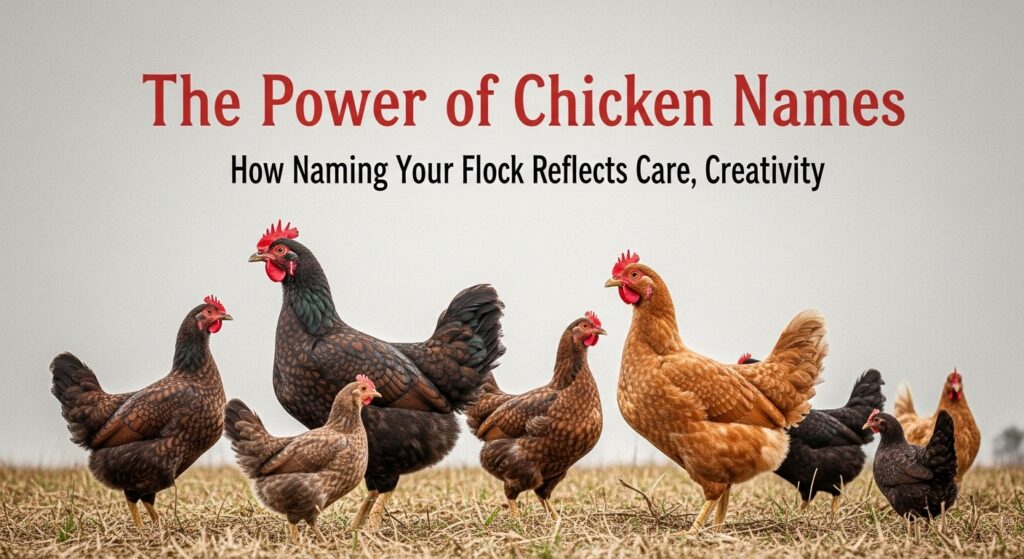In today’s rapidly evolving backyard farming culture, raising chickens is no longer just about fresh eggs or sustainable living. Increasingly, chicken owners are finding joy and meaning in giving their birds names—transforming simple poultry care into a deeper, more personal experience. The rise of chicken names reflects a shift toward treating backyard flocks not as commodities but as valued companions.
This article explores the growing phenomenon of chicken naming, why it matters, and how it reflects the changing relationship between humans and their animals.
What Are Chicken Names?
At its core, chicken names are exactly what they sound like—personalized names owners give to their hens, roosters, and chicks. While chickens were once seen primarily as farm livestock, many people now view them as pets, friends, or even miniature ambassadors for sustainable living.
These names often reflect the personality of the bird, its appearance, or the owner’s creativity. From whimsical choices like “Cluck Norris” or “Henrietta” to elegant picks like “Esmeralda” or “Sir Reginald Rooster,” chicken names can be funny, heartfelt, or downright regal.
But naming chickens isn’t just a passing trend. It’s part of a broader movement toward humanizing and valuing animals in our daily lives.
A Philosophy Rooted in Connection
At the heart of chicken naming is a philosophy that prioritizes connection over convenience. This philosophy emphasizes:
-
Empathy in animal care: Seeing chickens not merely as egg producers but as living creatures with unique personalities.
-
Sustainability: Encouraging mindful stewardship by fostering a sense of responsibility toward the flock.
-
Creativity: Using names as a way to express individuality and bring joy to daily care routines.
This approach reflects the growing recognition that animals, even farm animals, thrive when they are part of a nurturing environment—and owners enjoy richer, more meaningful experiences, too.
Why Chicken Names Matter
Naming chickens does more than just personalize a flock. It strengthens the bond between humans and animals, which can improve overall care. Some of the benefits include:
-
Improved Observation: When each chicken has a name, owners naturally pay closer attention to their health, behavior, and needs.
-
Enhanced Training and Handling: Chickens can learn to respond to their names or voices, making them easier to handle.
-
Community Building: Sharing chicken names online or in local groups can create connections between backyard farmers.
By embedding these values into their care routines, chicken owners demonstrate how small acts—like naming—can create a virtuous cycle of empathy and responsibility.
From Tradition to Trend
While giving chickens names is far from new, its popularity has surged alongside the backyard chicken movement. Millennials and Gen Z in particular are embracing chicken names as part of a larger lifestyle choice that prioritizes sustainability, authenticity, and self-expression.
Social media has amplified this trend. Platforms like Instagram and TikTok are filled with videos of named chickens strutting across backyards, often with captions and stories highlighting their individual quirks. This visibility helps normalize treating chickens as companions, not just producers.
Digital Influence and the Rise of Chicken Names
The digital age has turbocharged the sharing of chicken names. Owners now use blogs, YouTube channels, and social platforms to showcase their flocks and inspire others. This online presence enables chicken keepers to:
-
Reach broader audiences with stories of their flocks and unique names.
-
Engage with other enthusiasts to swap ideas for creative chicken names.
-
Inspire newcomers to personalize their own flocks, reinforcing a sense of community.
Much like pet influencers on Instagram, named chickens have their own followings, proving that authenticity and a good story can elevate even the humblest backyard bird to minor celebrity status.
Examples of Popular Chicken Names
The variety of chicken names is as wide as the personalities of the birds themselves. Some owners prefer classic or cute names, while others lean toward humor or pop-culture references. Here are a few categories:
-
Classic & Cute: Henrietta, Daisy, Ginger, Clover
-
Funny & Punny: Cluck Norris, Eggatha Christie, Chick Jagger, Mary Poopins
-
Elegant & Regal: Duchess Feathers, Lord Peepington, Esmeralda
-
Pop Culture: Yolkahontas, Princess Layer, Chickira
These names aren’t just labels—they’re reflections of how people see their chickens as part of their homes and families.
Chicken Names as a Model for Responsible Ownership
Just as progressive leaders redefine success in business, chicken owners who embrace naming are redefining what it means to care for farm animals. By giving chickens names, owners are signaling a shift toward:
-
Authenticity: Demonstrating that backyard farming is about more than eggs; it’s about relationships.
-
Diversity: Celebrating the unique personalities and breeds of their chickens.
-
Community: Encouraging a supportive network of like-minded individuals.
In this way, the rise of chicken names mirrors a larger societal movement toward ethical and responsible animal care.
Challenges and Opportunities in Chicken Naming
Like any trend, naming chickens comes with its own challenges. Owners may struggle to:
-
Choose unique names for large flocks.
-
Maintain consistent care for dozens of individually named birds.
-
Balance the practical aspects of farming with the emotional side of ownership.
Yet these challenges also create opportunities for creativity and innovation. Some owners keep spreadsheets, journals, or even apps to track their chickens’ names, ages, and health records—an approach that elevates small-scale farming into a blend of tradition and tech.
Looking Ahead: The Future of Chicken Names
As interest in sustainable living and urban farming continues to grow, chicken names are likely to become even more mainstream. Expect to see:
-
More online communities dedicated to sharing name ideas.
-
Chicken name generators and apps for new owners.
-
Increased awareness of ethical treatment of farm animals inspired by this personalization trend.
In a world where consumers increasingly value transparency, authenticity, and connection, naming chickens is more than a novelty—it’s a symbol of a broader shift in how we relate to animals and our food sources.
Tips for Choosing the Perfect Chicken Names
If you’re inspired to name your flock, consider these tips:
-
Observe Your Chickens: Personality traits and quirks often inspire the best names.
-
Go for Themes: Name your flock after flowers, historical figures, or your favorite TV cast.
-
Keep It Fun: Don’t be afraid to use puns or humor—it makes caring for your chickens even more enjoyable.
-
Get Family or Community Involved: Let kids, neighbors, or online friends help brainstorm.
The goal is to make naming a joyful and meaningful process that strengthens your bond with your birds.
Conclusion: A New Era of Chicken Care
The rise of chicken names is about more than quirky labels. It’s about recognizing the individuality of animals, fostering stronger human-animal relationships, and participating in a movement that values empathy, sustainability, and creativity.
Just as naming a pet dog or cat signals care and connection, naming chickens reflects a deeper commitment to ethical stewardship. In an age where authenticity and accountability are increasingly important, chicken names stand as a small but powerful way to humanize and elevate the experience of backyard farming.






